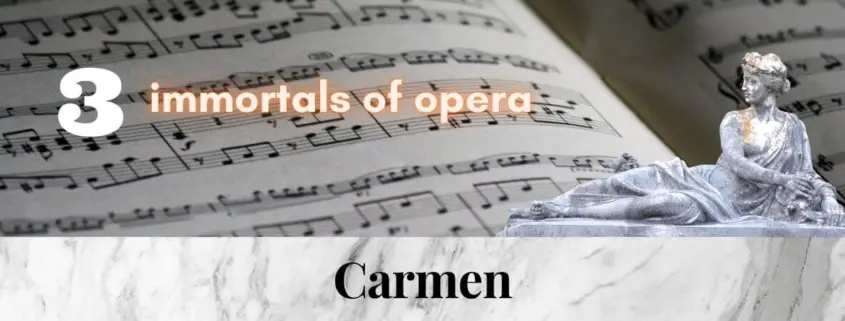3 immortal pieces from Bizet’s opera Carmen – the best interpretations in YouTube
“Carmen” is one of the immortal masterpieces of opera history. The role of Carmen is one of the most attractive roles written for female voices, and the work became the most performed opera in the entire repertoire.
The Habanera – a stroke of genius by Bizet
With the aria “L’amour est un oiseau rebelle” Bizet painted a true character portrait of the role of Carmen. Rarely has one of the great roles of opera literature been defined by just one aria as Carmen was with the Habanera. The Habanera is a piece of music of Cuban-African origin that contains a provocative sexual allusion with sensual movements. Bizet took the main theme from a work by the Spaniard Yradier, who had spent considerable time in the Caribbean. Bizet used a chromatic vocal line characteristic of Carmen. The verse is in a minor key and the chorus in a major key. The orchestra accompanied Carmen with the ostinato motif of the cellos, enhancing the hypnotic character of her habanera.
See the Latvian singer Elina Garanca. The Carmen is her parade role. Beautifully sung and probably the most erotic of all Carmen recordings.
L’amour est un oiseau rebelle – Garanca
The macho song of the toreador
There are different opinions on how the role of Escamillo should be sung. Should it be sung more lyrically or heroically and loudly ? Either way. Rarely has there been a greater and more spectacular stage performance than for Escamillo, the glorious bullfighter.
There is an amusing anecdote about this. At a rehearsal for the opera Carmen, a singer roared to such an extent that Thomas Beecham felt compelled to tell him, “Will you please remember, sir, that you are engaged to play the role of the torero and not the bull!”
Here is this scene from a fine film version with Ruggiero Raimondi as Escamillo.
Toréador – Raimondi
“Je dis que rien ne m’épouvante” and Leontyne Price
Bizet introduces this piece with a short, beautiful horn motif. The accompanying horns and sultry strings set with mutes create a touching mood.
Be sure to listen to the dreamy “Je dis que rien ne m’épouvante” with Leontyne Price in Herbert von Karajan’s famous recording.
Je dis que rien ne m’épouvante – Price







Leave a Reply
Want to join the discussion?Feel free to contribute!